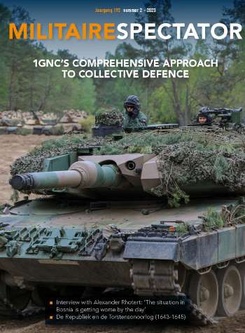Alexander Rhotert, recently addressing the Rheine section of the German Gesellschaft für Sicherheitspolitik on the situation in Bosnia and Herzegovina, fears further destabilisation in the Balkans. He believes that the EU should immediately stop all negotiations and aid funds for Belgrade and Banja Luka and increase the Althea protection force to combat-brigade strength and equip it with tanks. The Serbian government has long since become Moscow’s outpost and Rhotert has no doubt that Bosnia would have been the next Russian target if Moscow had been able to gain a quick victory against Ukraine shortly after the invasion in February 2022. If Bosnia were to fall apart, the consequences would be devastating: ‘Any partition would trigger a domino effect in the Balkans that no one would be able to control,’ the political scientist warns in an interview with the Militaire Spectator.
Alexander Rhotert is an author and political scientist who has worked for the EU and OSCE as well as the Office of the High Representative in Bosnia and Herzegovina for many years.
MS: In an article entitled ‘The dangerous dream of a Greater Serbia’ you wrote that Milorad Dodik, President of the Republika Srpska, and Serbian Predisent Aleksandar Vucic have been coordinating their political activities with Moscow for years. Why is it that the EU has allowed Dodik and Vucic to be used by the Russians for so long?
Alexander Rhotert: The Western Balkans have not been on the EU’s radar for many years. Only Moscow’s invasion of Ukraine on 24 February 2022 literally shook up the EU. I have warned for years about Russia’s spreading influence in former Yugoslavia, but hardly anyone was interested. But suddenly everything happened very quickly: within days the EU almost doubled the EUFOR protection force Althea in Bosnia. This shows that Brussels has woken up. This is a very positive and important sign. It would even be better, however, if the EU increased the force level to combat-brigade strength and equipped it with tanks. That would wipe any dreams of secession off the table.
MS: If nevertheless Dodik wanted to implement his secession plan, he would be fully dependent on the support fromMoscow. Would Russian President Vladimir Putin accept that risk that now while the war in Ukraine is raging and Russia has already been punished with EU sanctions? Or would he take the risk knowing that there are countries that are hesitant about sanctioning Russia?
Alexander Rhotert: In view of Russia’s extensive losses of men and material in the Ukraine war, I do not believe that Russia can afford to support the Serbs in Bosnia and Herzegovina or Kosovo with regular troops. Had Moscow’s aggression been successful in March there is no doubt in my mind that Bosnia would have been the next target. Putin would certainly have sent his ‘little green men’ to Banya Luka and Brcko, as he did in Crimea in 2014. The Russian ambassador in Sarajevo had already announced it indirectly in March when he spoke of a ‘Ukraine scenario’ for Bosnia should Sarajevo continue to move closer to NATO. The irony of history is that Dodik’s preparations for secession of the Republika Srpska have been put on hold by Putin’s war for the time being.
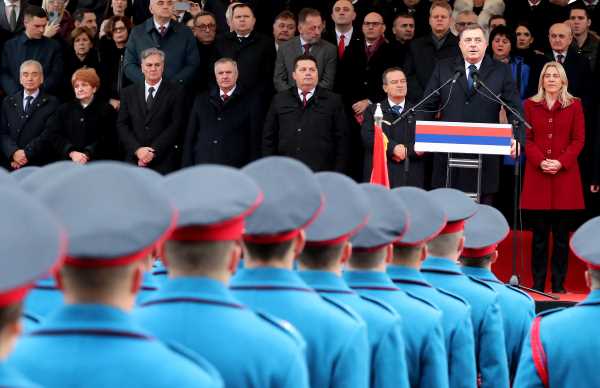
President Milorad Dodik delivers a speech in East Sarajevo on January 9, 2023: ‘He is carefully preparing the independence of Republika Srpska, politically with the erosion of the common state-level institutions and militarily by building up the RS’s own armed forces, bypassing the State Army'. Photo ANP/EPA, Fehim Demir
MS: You have said that Dodik uses ‘salami tactics’. What exactly does that mean?
Alexander Rhotert: Ever since 2006 Dodik has openly promoted his goal, namely the independence of Republika Srpska. He has been preparing this carefully, politically by undermining the common state-level institutions and militarily by building up the RS’s own armed forces, bypassing the national army. From 2018 onwards Dodik has been receiving military aid from Belgrade and Moscow, including military advisers. The RS parliament decided in December 2021 to ‘leave’ the electronic common state institutions, such as the state judicial organs, the state tax system and the armed forces of BiH as of June 2022. Knowing this would be political suicide in the current situation, Dodik is flexible. He says quite openly that independence can only be achieved when Donald Trump has been re-elected President of the USA. Dodik leaves no doubt that he is serious about this when the global political situation appears to be favourable to him. Brussels, Berlin and Washington must monitor the situation closely and guarantee the continued existence of the Bosnian state. Any partition would trigger a domino effect in the Balkans that no one would be able to control. We are talking about potentially violent conflicts in Bosnia, Montenegro, North Macedonia, Kosovo and Serbia itself. Belgrade seems to have forgotten that Serbia is a multi-ethnic state. If Dodik wanted the Serbian annexation of RS, the Bosniaks in Sandzak in Serbia would, likewise, seek to be annexed to Sarajevo.
In Kosovo, fueled by the radical rhetoric of Serbian President Aleksandar Vucic, the situation is currently even more dangerous. That Vucic was once Milosevic’s chief propagandist who, in 1995, called for 100 Bosniaks to be murdered for every Serb killed, seems completely forgotten. Incidentally, the idea and its execution originally came from the Nazis who, after Hitler’s attack on Yugoslavia, had 50 civilians executed for every German soldier killed by partisans. So much for Serbia’s ‘anti-fascist attitude’. And that, in turn, fits in with Vucic’s repetitive denial of the Srebrenica genocide and other Serbian war crimes. Vucic always leaves Dodik ample room at joint press conferences to launch his hate tirades against the Bosniaks, which always end with multiple Srebrenica genocide-denials. To date, by the way, denying the genocide has so far gone entirely unpunished, although there is a genocide denial law in Bosnia that provides for prison sentences of up to five years.
The fact that Vucic’s state-controlled media vilify the Kosovo Albanians in the worst possible way as ‘Siptari’ and spread war propaganda on a daily basis is bad enough. But when Vucic, President of Serbia, a candidate country for EU membership, insults Kosovo’s prime minister as ‘terrorist scum’, it is more than scandalous. Belgrade has long since been an vassal of Moscow. The EU should therefore immediately stop all negotiations and aid to Belgrade and Banja Luka.
MS: Dodik publicly announces that he wants to create a legal basis for RS’s own army, its own intelligence services, its own judicial organs and tax system. Why does the EU not react when such a de facto secession is announced, while the American government intensifies the financial penalties against Dodik and his entourage? Is it that the US and the EU do not see eye to eye in this matter?
Alexander Rhotert: Unfortunately, there are some supporters of Dodik and Vucic in the EU, first of all Hungary’s Prime Minister Viktor Orban and his EU Enlargement Commissioner Oliver Varhelyi, who repeatedly tries to provide Dodik with financial support. Also regrettably, there are still politicians in both Washington and Europe who see Belgrade, and thus Vucic, as a ‘stabilising factor’ in the Balkans. Exactly the opposite has been the case for over 30 years. Belgrade and, to a lesser extent, but sadly increasingly, Zagreb, have taken up the war agendas of the former presidents of Serbia and Croatia, Slobodan Milosevic and Franjo Tudjman, and want to implement them. The Serbian and Croatian leaders believe it is a good time to start again from where the war ended in 1995. Belgrade and Zagreb’s ambitions to divide Bosnia and Herzegovina among themselves are to be achieved in the medium term for which currently the foundations are being laid. Serbia’s powerful intelligence chief Aleksandar Vulin, who was previously both defence and interior minister, has – for the last two years blatantly been propagating the ‘Serbian World’ project, a code name for the Greater Serbian project. Zagreb has found an ally in the High Representative for Bosnia, former German politician Christian Schmidt, who is committed to the goals of Croatia’s nationalist HDZ party and has imposed illiberal electoral laws that Croatian nationalists had been demanding for years. This kind of appeasement policy, supported by Washington but fortunately rejected by Berlin and Brussels, is doomed to fail , as was the case with the policy of appeasement up to the mid-1990s.
MS: You advocate the stationing of at leasta 3,000 men strong EU combat brigade with Leopard 2 tanks in the Brcko district. Why would a substantial contribution of the Bundeswehr be so important?
Alexander Rhotert: Both Germany and the Bundeswehr enjoy an excellent reputation in Bosnia. Brcko is the Achilles’ heel of the Greater Serbia idea, as it divides the Republika Srpska. Even Serb leader Radovan Karadzic said in 1993 that during the Bosnian war, if the U.N. had stationed 5,000 soldiers there, the war would have been over. Despite the complexity of the Western Balkans, some solutions, as in this case, are quite simple and obvious. You just have to follow them up but, even with such preventive measures, there are decision-makers who actually believe that the Serbs should not be ‘provoked’. Still, the decision of the Federal Government and the Bundestag to send Bundeswehr soldiers to the EUFOR/Althea mission again is a very positive step.
MS: In an interview with the military Spectator, Bosnian political scientist Jasmin Mujanovic pleaded for Bosnia’s rapid membership of NATO. What do you think? How would Belgrado and Moscow react?
Alexander Rhotert: What Moscow thinks, I have already quoted in the words of the Russian ambassador in BiH. BiH, like any potential candidate country, must have the absolute right to choose its own alliances, just like the other Western Balkan countries. Whatever the objections of Belgrade and Moscow, we should not allow ourselves to be influenced by them. The integration into NATO desired by the Western Balkan countries must be given top priority. The sooner this happens, the lower the potential risk of armed conflict. If NATO/KFOR had not been in Kosovo, we would long have had the second war in Europe this year. Belgrade is even threatening to intervene and has moved units to Kosovo’s northern border.
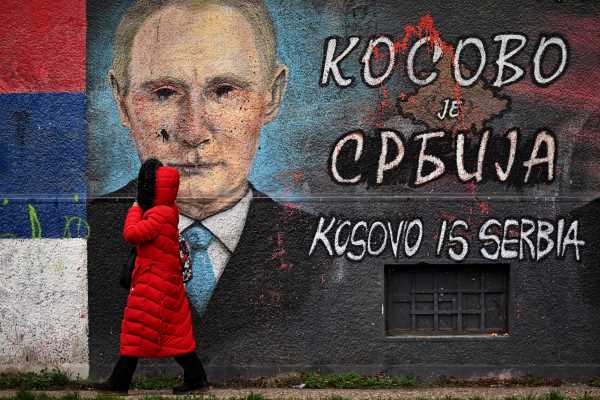
A pedestrian walks past a mural painting of Russia's President Vladimir Putin and the map of Kosovo in Belgrade on January 23, 2023. Photo ANP/AFP, Andrej Isakovic
MS: During the Bosnian war, Serbia sent money, weapons and ammunition to separatists in Bosnia and Croatia. Moscow did the same in Donbass, pushing nationalism and spreading the myth that NATO was the real danger. Can societies be influenced from the outside when people are bombarded day in day out with false news and lack free media? Is the propaganda from Belgrade and Moscow, which constantly mentions – minorities under threat, so convincing that even European politicians believe that it would be better not to ‘provoke’ Vucic, Dodik and Putin because they stand up for the interests of their ‘fellow citizens’?
Alexander Rhotert: Putin is acting just like his mentor Milosevic. As you said, the worst hate propaganda and military support for ‘their comrades’ are central elements of Putin and Milosevic’s strategy. Dodik in Bosnia or Denis Pushilin in Donbass, however, are puppets of Vucic and Putin, without whom they would be nothing. That’s exactly why Dodik at the moment doesn’t dare to take the ultimate step. He knows that secession would automatically spark off an armed conflict. This does not require armoured divisions in mostly mountainous Bosnia. Although Dodik has been heavily armed by Belgrade and Moscow, his chances of winning a war against Sarajevo without the participation of Belgrade and Moscow are nil. Without Belgrade’s leadership in the aggression against Bosnia, Karadzic and Mladic would never have been able to wage war in BiH.
MS: Serbia and Republika Srpska have been accepting money from the EU for years, but refuse to comply with the liberal values adhered to in Brussels. How should the EU proceed to change this? Or are you rather pessimistic?
Alexander Rhotert: All their funds should be frozen immediately until Belgrade and Banja Luka have fundamentally changed. It is not ‘only’ about genocide denial, but also about Kosovo, Dodik’s secessionist intentions in Bosnia and the notion of a Greater Serbia that Vucic is pursuing. Not to forget the sanctions against Russia, which Belgrade still refuses to support. Vucic and Dodik are Putin’s staunchest allies, alongside [Belarus President] Lukashenko. Dodik has officially been received in the Kremlin 15 times in the period from 2006 alone.
MS: How do you see the future of EUFOR? Will Russia be able to push through the plan to veto the mission’s mandate in the UN Security Council? What would be the consequences?
Alexander Rhotert: At Dodik’s request, Russia did not veto it in the UN Security Council, as otherwise NATO, originally mandated by the Dayton Agreement, would have stepped into the vacuum. EUFOR was clearly the lesser evil for Dodik. Brussels should be alarmed, however, that Dodik will pull out all the stops to persuade his supporters, namely Orban, to exert more influence in EUFOR. Hungary is already the third largest troop contributor to the Althea mission and has already expressed interest committing troops to COMEUFOR. Considering the current friction with Orban this could become a problem. Brussels should choose a ballast-free option as soon as possible. Slovakia would make a good choice because it also provides a considerable part of Althea’s troops and has shown itself to be a fundamentally important and extremely loyal partner during the war in Ukraine.
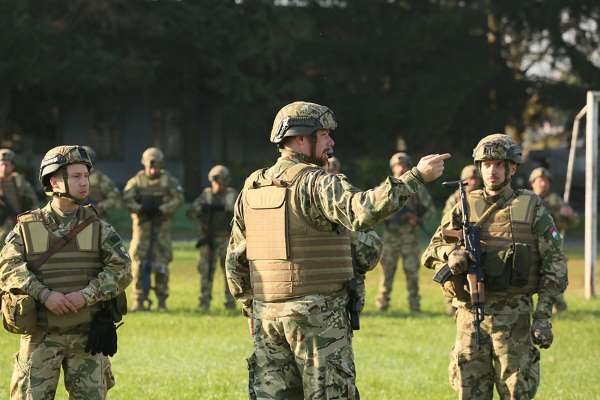
‘Hungary is already the third largest troop contributor in the Althea mission and has already expressed interest some time ago to provide COMEUFOR’. Photo EUFOR, G. Payer
MS: When comparing the political climate in Washington concerning the Western Balkans during Donald Trump’s Presidency with that of the present moment, with Joe Biden, who stands for liberal values and NATO unity, now in the White House, what has changed in the American approach?
Alexander Rhotert: Unfortunately, President Biden has seriously disappointed expectations regarding the Western Balkans, especially with regard to Bosnia and Herzegovina, but also Kosovo. Instead of supporting reform-oriented policy options, Washington has embraced nationalists, true to the motto: stability first. This is a one-way street. The future cannot be shaped with recipes from the war era of the 1990s. The background is the false assumption that the success story of the Washington Treaty of creating a federation of Bosniaks and Croats of 1994 could be repeated. At that time the Clinton Administration had ended the war between the Croats and Bosniaks with considerable commitment and high-profile emissaries such as Richard Holbrooke and Ambassador Peter Galbraith. The original military alliance was also revived and armed. Only in this way could the balance of power in the former Yugoslavia be achieved in the medium term: the foundation for peace as agreed upon in the Dayton Accords.
Now, almost 30 years later, Washington is trying to apply this recipe again by massively supporting the HDZ in Bosnia by way of a massive political and diplomatic effort. Cementing HDZ’s participation in all governments would be a foundation for Bosnia’s future. The Biden Administration fails to recognize that Bosnia has changed a lot since 1994. Nationalists of all ethnicities have suffered heavy losses. Croats exist not only in the HDZ, but also in many other, even multi-ethnic, liberal parties. In addition, the HDZ has been hugely overrepresented in the country’s institutions and levels of government since Dayton. Only achieving nine percent of the vote it sometimes occupies up to 40 percent of all eligible positions. This is hardly democratic. And in this completely pro-HDZ situation, the High Representative, with Washington’s blessing, has once again strengthened the position of the HDZ. This cannot and will not work in the medium term. By the way, HDZ chairman, Dragan Covic, has been a close ally of Dodik’s since 2006 and coordinates with him all steps of the road leading to the partition of Bosnia and Herzegovina.
But even in deeply pro-American Kosovo, Washington is beginning to squander sympathy. There is no point in appeasing an immensely aggressive, nationalist politician like Vucic and putting Kosovo’s moderate Prime Minister, Albin Kurti, under pressure. Bosnia and Kosovo want to be fully integrated into the Euro-Atlantic structures. We are talking about two Muslim-majority countries that are extremely pro-Western. How can it be that we do not put the friends of Moscow, Vucic, Milanovic, Dodik and Covic in their place and do everything we can to stabilise BiH and Kosovo to the maximum? There is still a lot of room for improvement here. Brussels should show more resolve here and convince Washington that their current course is wrong.
MS: Do you see any opportunities for the implementation of the 5+2 Agenda and for the strengthening of the position of the High Representative for Bosnia?
Alexander Rhotert: At the moment, I see the situation getting worse every day. There has been little progress on the 5+2 Agenda for years. There are even rumours that on this issue the High Representative wants to intervene by means of the Bonn Powers, on behalf of Dodik, namely with regard to the military state properties. That would be a meltdown. They are rumours, but they were exactly similar to those regarding the election and constitutional changes, which Schmidt then imposed by decree on election night, against Berlin’s and Brussels’ will. The invitation of the EU Parliament to explain his decisions, Schmidt first accepted but then canceled at short notice. Brussels should not allow to be treated like this, because it pays half of the budget of Schmidt’s authority, the OHR. Instead of going to Brussels, Schmidt was then seen with his HDZ friends in the Croat-dominated community of Kiseljak near Sarajevo, where he watched the Croatia-Morocco football match. He was photographed in front of flags of the illegal Croatian wartime para-state ‘Herzeg-Bosna’, whose six-member leadership was sentenced to almost 120 years in prison by the Hague War Crimes Tribunal in 2017. Nationalist Croatian songs were also played. This is certainly not an environment fit for a High Representative. But all this little seems to affect Schmidt since he is backed by Washington.
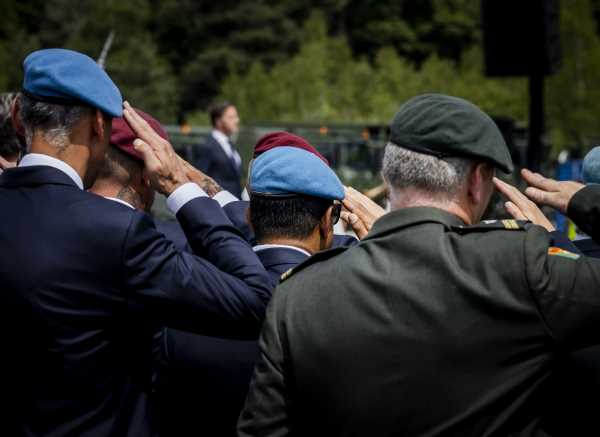
Dutchbat III veterans were rehabilitated by the Dutch government in 2022: 'Dutchbat is unfairly blamed for the main international debt, despite the terrible misconduct of the Bosnian-Serb troops and the forced cooperation with them.'. Photo ANP, Remko de Waal
MS: Currently many Dutch veterans who served in Bosnia during the mid-nineties feel the urge to return to the area where they were stationed at the time. Many were or still are traumatized because they could not prevent the murder of thousands of Muslims in Srebrenica. In an article in the Neue Züricher Zeitung you describe how Dutchbat had no chance against the Bosnian Serbs. As you write, there was consensus among the main actors to get rid of the enclaves. Above all, the Supreme Commander of the UN peacekeeping forces, General Bernard Janvier, and the UN Special Envoy Yasushi Akashi, are said to be partly to blame for their passivity and lies that made the Bosnian Serbs feel safe enough to advance without being attacked themselves. Janvier and Akashi were never held accountable. Do members of armed forces always have to expect to find themselves in situations where warring parties take no interest in diplomacy?
Alexander Rhotert: NATO’s military operations in former Yugoslavia, Bosnia in 1995 and Kosovo in 1999, proved that aggressors can only be brought to reason by military force. These missions were extremely effective and achieved their objectives without significant losses. They were the foundation for diplomats to take serious action. The ‘negotiations’ held by the various EC and UN negotiators – from Lord David Owen to Cyrus Vance – from 1992 to mid-1995 were a loss of time. It was a time when 100,000 people were killed. In 1992, EC emissary Owen said in besieged Sarajevo: ‘Don’t live under the illusion that the West will help you. Don’t dream dreams.’ This was sheer cynicism. Lord Owen thus laid the foundation for political and military decision-makers such as Akashi and Janvier to act – or not to act – as they did in 1995.
It is quite clear that Akashi and Janvier, with NATO as the greatest military power in human history in the background, could have stopped the Serbian soldiers within hours. If not on 9 July, then on 10 or, as the UN leadership had promised, in the morning of 11 July. These were the orders that UNPROFOR had given to Dutchbat in Sarajevo and which had been backed by Akashi and Janvier: Defend the UN protection zone by all means, of course also, and especially, with NATO air support. Precisely the content of these orders was sent in writing to General Mladic on July 9 as a warning. If NATO warplanes had taken out the first two or three Serbian tanks on the approach road to Srebrenica on the morning of July 11, the genocide would never have happened. Why did Akashi and Janvier delay authorizing NATO air support until 12:20 hours on July 11? Because by this time Srebrenica had already been evacuated, the Serbs had already taken control. The following two airstrikes were mere alibi actions by Akashi and Janvier to demonstrate to the world public that air strikes were pointless. The fact that they did not take place until 2 p.m. was pointless. Just three hours earlier they would have saved the lives of almost 8,500 people and another 400 in Zepa, because if Srebrenica had not been conquered, the Serbs would not have been able to reach Zepa. This is the quintessence of the whole tragedy of Srebrenica and Zepa.
Even today, almost 28 years later, this calamity is hardly addressed. Dutchbat received international blame, which is unfair, despite the terrible decisions and cooperation with the Serbian troops. Of course, the Serbian troops are the main culprits. The War Crimes Tribunal in The Hague has dealt with this meticulously and impressively. And the respective Dutch governments have also contributed an incredible amount to fact-finding. But it is truly shameful that the main international leaders at the time, Akashi and Janvier, are so shamefully shirking their responsibility. See how the UN Supreme Commander of UN Forces in Rwanda, General Romeo Dallaire – who, by the way, was born in the Netherlands – acted. With a very small UN force, risking his own life and that of his soldiers, he tried to prevent the 1994 genocide of the Tutsis at the hands of the Hutus. He was the first to speak of genocide. That is in stark contrast with Akashi and Janvier, who did everything during and after the genocide of Srebrenica to prevent a NATO mission against the Serbs. I can’t think of a braver soldier than General Dallaire. That he was promoted after his assignment is fair. But why General Janvier and Lieutenant Colonel Karremans were promoted is a mystery to me. Did Karremans really have to drink slivovic with Mladic and accept gifts for himself and his wife? That, too, is appeasement.
That Srebrenica and Zepa could have been saved was proven only days later in Gorazde. After the withdrawal of all British UN soldiers from the third UN safe zone, there was a warning that deterred the Serbs, even though they had besieged Gorazde, like Srebrenica and Zepa, for years.
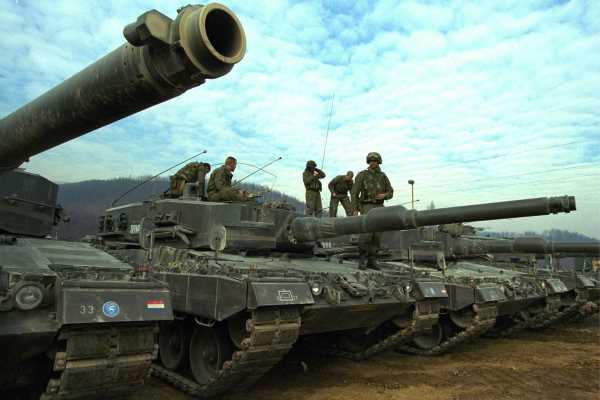
Dutch Leopard 2A4 tanks in Bosnia, 1996: ‘The Bosnian political system as such has been quite unstable from the outset due to its extreme complexity’. Photo Beeldbank NIMH
MS: Is the Bosnian political system actually too complicated to function in a stable way? Were there alternatives in 1995 or, given the political and military situation, was there not enough time to work them out?
Alexander Rhotert: At the time, people were glad that this compromise could be reached at all. The position of the above-mentioned city of Brcko, which became a district alongside the two entities by international arbitration in 1999, was even excluded from the Dayton talks at that time. Otherwise, the Dayton negotiations would have failed and the war would have continued. This shows how narrow the common denominator was at that time.
I would not use the word stable here, because the system as such has been quite unstable from the outset due to its extreme complexity. But there was a time, especially from 1998 to 2006, during which things were steadily going uphill. There has been measurable progress generated by pressure. This was the Bonn Powers, through which then High Representatives Carlos Westendorp, Wolfgang Petritsch and the late Lord Paddy Ashdown successively built up the country. Common license plates were imposed and thus created the conditions for the freedom of movement of every citizen, which in turn was the foundation for the return of over a million refugees. A common border protection was established by the UN, the intelligence services were united, just like the former three armies. A single tax system and common judicial bodies were established. Foreign investment flowed into the country and created many jobs, such as in the automotive supply industry and metal processing.
As long as the sword of Damocles of dismissal hung over the politicians, they cooperated. So Dayton can work, under tight conditions. But using the Bonn Powers to give advantages to a particular political party like the HDZ makes no sense in the context of peace implementation.
Schmidt’s successor will have a Herculean task in cleaning up the pile of shards he will find. But then surely the question you raised about the future of the Dayton system will be asked. Today, BiH has 14 governments with nearly 200 Ministries and is one of the poorest countries in Europe. This is not sustainable. Historically and economically it would make sense to replace the entities, including the 10 cantons of the federation, with four or five strong regions, as is the case in neighbouring Croatia. Incorporating the whole of Herzegovina from Trebrinje via Mostar and Konjic to Tomislavgrad in a region would make sense. Although it would be Croatian-dominated, it would be quite multi-ethnic. And all regions should be built in accordance with such historical-economic criteria. Then not one people could ‘dominate’ the other, as nationalists keep claiming. Unfortunately, this will probably take some time because nobody dares to answer this question. Until now. But perhaps after the hopefully rapid end of Russia’s war of aggression against Ukraine, a possibility will present itself.
